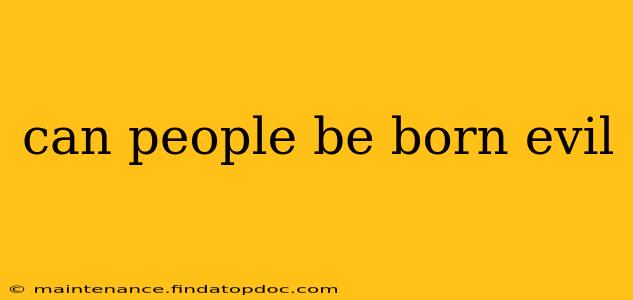Can People Be Born Evil? Nature vs. Nurture in the Development of Morality
The age-old question of whether people are born evil or whether evil is learned has captivated philosophers, theologians, and scientists for centuries. There's no simple yes or no answer, as the reality is far more nuanced and complex. It involves a fascinating interplay between nature (genetics and biological predispositions) and nurture (environment, upbringing, and social influences).
While no one is born inherently "evil" in the sense of possessing an innate desire to inflict harm, the debate centers on the role of innate tendencies and predispositions that might contribute to antisocial or violent behavior.
What Does the Research Say About Innate Predispositions?
Some research suggests that certain genetic and neurological factors might increase the likelihood of developing antisocial tendencies. Studies have explored links between specific genes and aggressive behavior, although these are complex and often influenced by environmental factors. Similarly, brain abnormalities or damage in certain areas can sometimes be associated with increased impulsivity and a reduced capacity for empathy, which are factors often linked to violent or harmful behavior. It's crucial to understand, however, that these are correlations, not deterministic factors. Having a genetic predisposition does not mean an individual is destined to become "evil."
Is Evil Learned Through Upbringing and Environment?
The overwhelming consensus among experts is that environment plays a crucial role in shaping moral development. Children learn social norms, empathy, and moral reasoning through interactions with caregivers, peers, and society. Neglect, abuse, exposure to violence, and a lack of positive role models can significantly impair moral development and increase the likelihood of antisocial behavior. Conversely, supportive and nurturing environments that emphasize empathy, cooperation, and respect for others are crucial for fostering prosocial behavior.
What About Sociopathy and Psychopathy?
Conditions like sociopathy and psychopathy are often cited in discussions about "evil." These conditions are characterized by a lack of empathy, remorse, and a disregard for social norms. However, even in these cases, the development of these conditions is complex and likely involves a combination of genetic predispositions and environmental influences, such as early childhood trauma or neglect. It's important to avoid pathologizing all antisocial behavior as stemming solely from these conditions.
Is it Nature or Nurture? The Interaction Effect
The question isn't truly "nature OR nurture," but rather "nature AND nurture." It's the interaction between an individual's genetic predispositions and their environment that ultimately shapes their behavior and moral compass. Someone with a genetic predisposition toward impulsivity might develop into a well-adjusted individual in a supportive environment, while someone without such predispositions might engage in harmful behavior in a severely neglectful or abusive environment.
Can a Person Change?
The good news is that human behavior is not fixed. Even individuals with challenging predispositions or histories can learn to manage their impulses, develop empathy, and make positive changes in their lives through therapy, rehabilitation, and supportive relationships.
Can Evil Be Defined?
The very concept of "evil" is itself subjective and culturally influenced. What one society considers evil, another might view differently. Understanding the complexities of human behavior requires moving beyond simplistic labels and engaging in nuanced discussions about the factors contributing to harmful actions.
In conclusion, the notion of someone being born "evil" is an oversimplification. While biological and genetic factors might play a role in increasing the likelihood of certain behaviors, it's the interplay between these factors and the environment that ultimately shapes an individual's moral development and actions. Understanding this complex interaction is crucial for developing effective strategies for preventing violence and promoting prosocial behavior.
